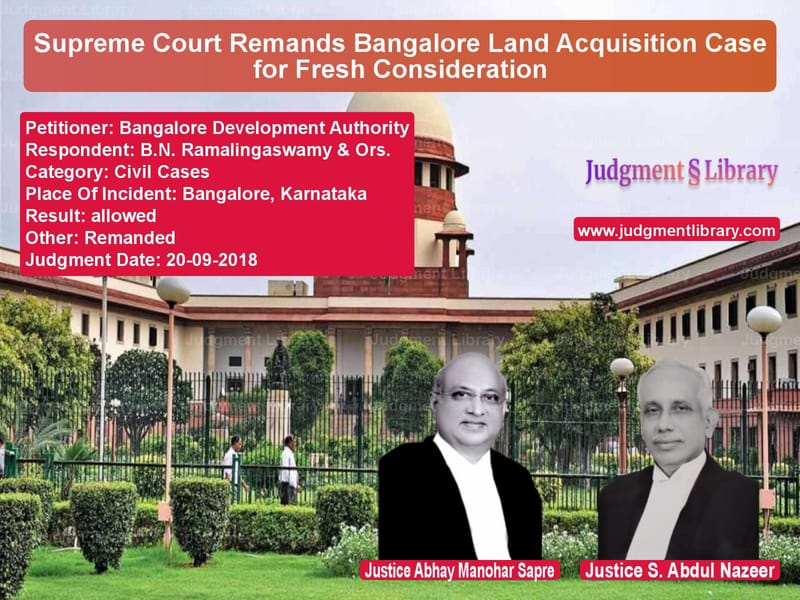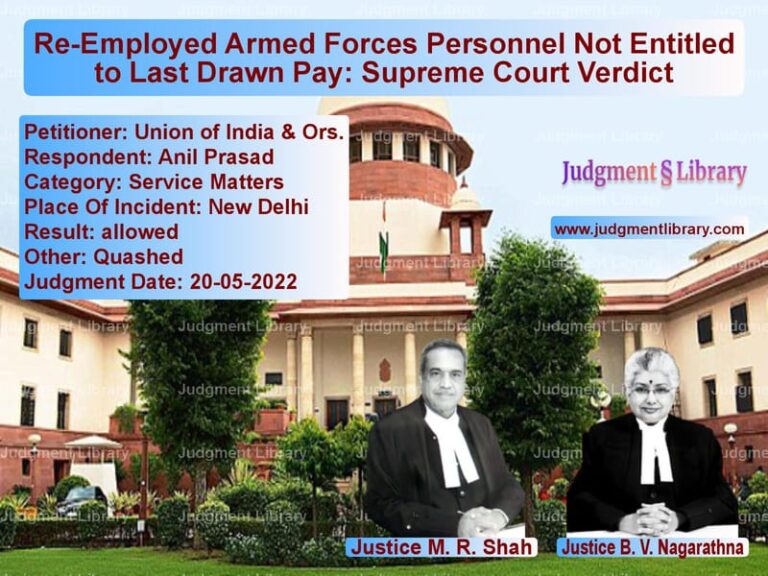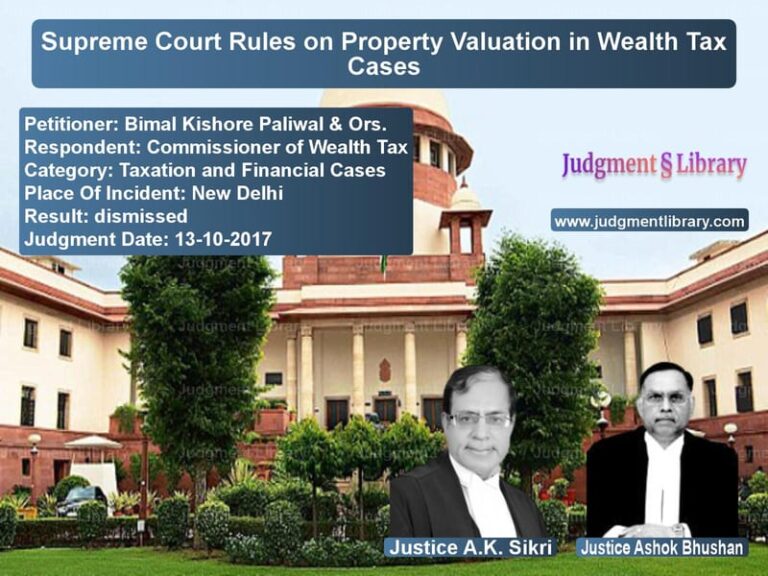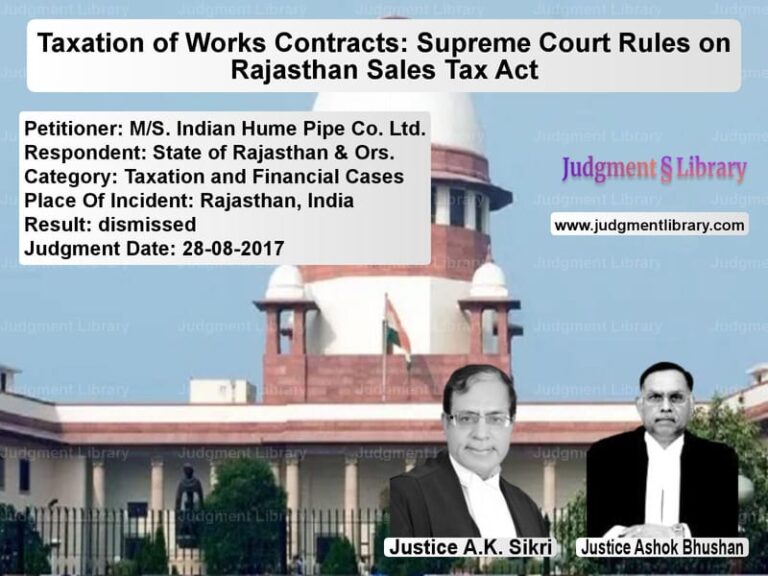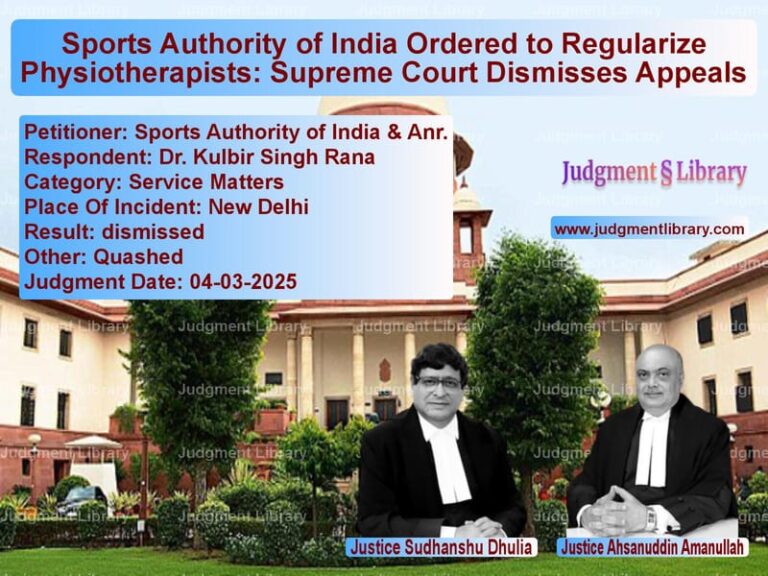Supreme Court Remands Bangalore Land Acquisition Case for Fresh Consideration
The Supreme Court, in its judgment dated September 20, 2018, in the case of Bangalore Development Authority vs. B.N. Ramalingaswamy & Ors., remanded the case back to the Karnataka High Court for fresh consideration. The case involved a dispute over land acquisition for urban development, and the Court found that the High Court had not adequately addressed the legal and factual issues raised by the Bangalore Development Authority (BDA).
Background of the Case
The dispute revolved around the acquisition of land bearing numbers 15/4, 16/4, and 16/8 in Jedahalli Village, Bangalore North Taluk, measuring approximately 6 acres and 3 guntas. The Bangalore Development Authority (BDA) had issued a notification on February 19, 1976, to acquire the land for urban development purposes. However, the landowners, B.N. Ramalingaswamy & Others, challenged the acquisition process in a writ petition filed before the Karnataka High Court.
Legal Challenge Before the High Court
The respondents (landowners) filed Writ Petition No. 28293 of 1991, contesting the entire acquisition process, arguing that:
- The acquisition was illegal, void, and bad in law.
- The resolution passed by the BDA (Resolution No. 1051 dated January 16, 1976) was flawed.
- The land was not used for the intended purpose, making the acquisition unsustainable.
The Karnataka High Court’s Single Judge ruled in favor of the landowners and quashed the acquisition proceedings. The BDA then appealed before a Division Bench, which also dismissed the appeal, affirming the earlier decision.
Appeal Before the Supreme Court
Aggrieved by the Karnataka High Court’s decision, the Bangalore Development Authority (BDA) filed a Special Leave Petition before the Supreme Court, arguing:
- The High Court had failed to consider crucial legal arguments presented by the BDA.
- The acquisition process was lawful and followed all statutory requirements.
- The High Court did not discuss the legal and factual issues raised in the intra-court appeal.
Supreme Court’s Observations
The Supreme Court, comprising Justices Abhay Manohar Sapre and S. Abdul Nazeer, found significant procedural lapses in the High Court’s handling of the case.
1. High Court Failed to Address Legal Issues
The Supreme Court criticized the Karnataka High Court for disposing of the BDA’s appeal in a cursory manner. It observed:
“The Division Bench did not deal with any of the issues arising in the case, nor did it consider the submissions urged by the parties, especially the BDA.”
2. Need for Detailed Examination
The Supreme Court emphasized that given the complexity of the case, the High Court should have examined the matter in depth:
“The intra-court appeal involved factual and legal issues that were decided by the Single Judge. Once carried in appeal, it was incumbent upon the Division Bench to deal with all such issues and record its findings.”
3. Remand for Fresh Consideration
Since the High Court failed to conduct a thorough review, the Supreme Court decided to remand the case for reconsideration:
“We find ourselves unable to concur with such disposal and feel inclined to set aside the impugned order and remand the case to the Division Bench for a decision afresh.”
Final Judgment
The Supreme Court ruled:
- The appeal was allowed.
- The Karnataka High Court’s judgment was set aside.
- The intra-court appeal was remanded to the High Court for fresh disposal on merits.
- The High Court was directed to decide the appeal within six months.
Implications of the Judgment
This ruling has significant implications for land acquisition and urban development laws.
1. Ensuring Fair Consideration in Land Disputes
The judgment reinforces the principle that courts must fully engage with legal and factual issues in land acquisition cases.
2. Holding Higher Courts Accountable
The ruling establishes that appellate courts must conduct thorough reviews and cannot dismiss appeals without reasoned judgments.
3. Protection of Property Rights
The decision highlights that landowners have the right to contest acquisitions and that authorities must ensure procedural compliance.
Conclusion
The Supreme Court’s decision in Bangalore Development Authority vs. B.N. Ramalingaswamy & Ors. is a crucial ruling that upholds procedural fairness in land acquisition cases. By remanding the case, the Court has ensured that the Karnataka High Court fully examines the legal and factual aspects of the dispute. This ruling reaffirms the judiciary’s role in balancing urban development with individual property rights.
Petitioner Name: Bangalore Development Authority.Respondent Name: B.N. Ramalingaswamy & Ors..Judgment By: Justice Abhay Manohar Sapre, Justice S. Abdul Nazeer.Place Of Incident: Bangalore, Karnataka.Judgment Date: 20-09-2018.
Don’t miss out on the full details! Download the complete judgment in PDF format below and gain valuable insights instantly!
Download Judgment: Bangalore Developmen vs B.N. Ramalingaswamy Supreme Court of India Judgment Dated 20-09-2018.pdf
Direct Downlaod Judgment: Direct downlaod this Judgment
See all petitions in Property Disputes
See all petitions in Landlord-Tenant Disputes
See all petitions in Damages and Compensation
See all petitions in Judgment by Abhay Manohar Sapre
See all petitions in Judgment by S. Abdul Nazeer
See all petitions in allowed
See all petitions in Remanded
See all petitions in supreme court of India judgments September 2018
See all petitions in 2018 judgments
See all posts in Civil Cases Category
See all allowed petitions in Civil Cases Category
See all Dismissed petitions in Civil Cases Category
See all partially allowed petitions in Civil Cases Category

